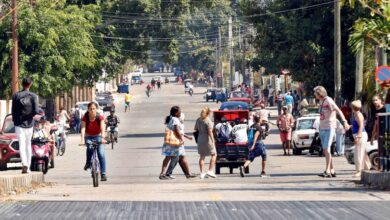El Salvador: what are the implications of nationals being deported from the USA?
Salvadoran immigrants will have 18 months to get a legal permit or leave the country, but the Central American country is not ready to receive repatriates
Donald Trump’s government has once again attacked immigrants living in the United States. This time, the affected are around 200,000 Salvadorans protected by the Temporary Protected Status (TPS) and for whom the benefit was withdrawn. The decision involves removing the protection status that prevents the deportation of Salvadoran citizens living in the country. In this way, they have a period of 18 months to leave the US or get another legal residence permit to stay. Otherwise, they will be considered undocumented and may be deported. This decision is made after the same determination was made with the immigrants from Nicaragua and Haiti with a similar argument: "The original conditions caused by the 2001 earthquakes no longer exist."
Despite these claims, it has a great impact on migrants, given that 51% of Salvadorans with TPS have lived in the US for at least 20 years and many of them have US born children who, unlike them, have citizenship and cannot be deported. Faced with this decision, several organizations that defend the rights of immigrants have spoken against. The executive director of CASA de Maryland, Gustavo Torres, told Univisión Noticias that "195,000 immigrants are on the verge of deportation (…). It's about people, parents, workers who have been in the US for almost two decades, have established their homes here legally and have fought for our nation". On the other hand, those who support the measure as the Federation for the American Immigration Reform affirm that the conditions in El Salvador are good enough for the migrants to return.
The TPS and the Trump policy changes
The TPS was created in 1990 to grant temporary visas and work permits to citizens affected by wars or natural disasters. In this way, the citizens of the beneficiary countries that are in the USA cannot be deported given the little stability of their countries of origin. El Salvador is the fourth country to lose the TPS and its citizens are the largest group of beneficiaries to be affected. The previous cancellations were for Sudanese, Nicaraguan and Haitian immigrants.
The immigrants of Salvador were granted this after two earthquakes in 2001 that killed more than 1,150 people and left hundreds of thousands homeless. Since then, it has spread 11 times. It should be noted that in 2016, former President Obama expanded the protections because El Salvador still suffered the effects of the earthquakes, had an increase in violence and insecurity and the country could not absorb the return of immigrants.
A nefarious possibility for El Salvador
El Salvador is a country with 6.2 million people and it has one of the highest homicide rates in the world due to the growing violence, poverty and inequality. For this reason, while illegal immigration from Mexico has slowed down, in the cases of El Salvador and other Central American countries it has increased.
"El Salvador continues to be unable, temporarily, to properly handle the return of its nationals", cited the announcement signed by former Secretary of Homeland Security, Jeh Johnson. The possibility of the return of 200,000 immigrants can be a great blow in all spheres of the country. On the economic side, it is said that remittances sent by immigrants represent 17% of El Salvador's GDP, mostly sent from the US.
In addition, the Central American country, and a large part of its neighbors, has a high poverty rate and marked social problems. Therefore, it doesn’t have the possibility of offering employment to people who return and the economy would decrease, the government resources would be reduced and poverty, inequality and insecurity would increase.
According to the Internationalist Mauricio Jaramillo, in interview for Latin American Post, there will also be a social aspect. There is talk of a deadline that is not enough for families who have lived in the US for decades, with children who know little about their country of origin and "do not consider El Salvador as a country to live". In addition, many of these families could be victims of the same violence that forced them to leave the country.
The uncertainty generated by this panorama has led the Government to make efforts to find an alternative with the US. According to the Minister of Foreign Affairs of El Salvador, Hugo Martínez, an attempt has been made to achieve an extension of the program and to seek approval of a project in the US congress that will help those affected. "These 18 months give us a prudential time to continue talking in Congress (US) to seek legislation to give the transition from temporary to residency", he said.
Likewise, the government has a plan in place to help its immigrant citizens from alliances with organizations that defend immigrant rights in order to provide legal advice to change their status in the United States without the need for new legislation. Despite the government's attempts, there is a great possibility that a large number of immigrants will be forced to return to El Salvador, many of them forced to leave behind their homes, their children and the security they had achieved, which implies a great social and economic human cost that could seriously impact the country.
What does this mean for the US?
This decision is taken within an aggressive anti-immigrant policy promoted by president Trump. In this way, immigration arrests have been increased by 40%; the number of refugees accepted annually has been reduced and the program of Deferred Action for Childhood Arrivals (DACA) has been attacked.
With the government's decision, these immigrants face three possibilities: they can return to their country of origin of their own free will, they can try to legalize their presence in the United States, or they can stay illegally. For Jaramillo, it is unlikely that a large part of these migrants will get legal permission, especially when taking IGNORE INTO account the difficulties faced by universities institutions and incorporated companies that seek to protect employees and students due to the nature of the current policies.
This implies that a representative number of people are left in a situation of uncertainty. For his part, Pablo Alvarado, director of the National Network of Day Laborers, an organization that brings together Salvadoran migrants in the US, told BBC News that "The vast majority will not return to El Salvador. They will go back to clandestinity, because it is preferable to flee from the agents of migration than to flee the gangs". Similarly, it does not seem likely that a large-scale deportation will be carried out due to the large number of people affected, its high economic cost and the logistical difficulties involved. However, all these measures continue to increase polarization in a country that is increasingly divided over the migrants.
Latin American Post | Dayana Martínez C
Copy edited by Laura Rocha Rueda





